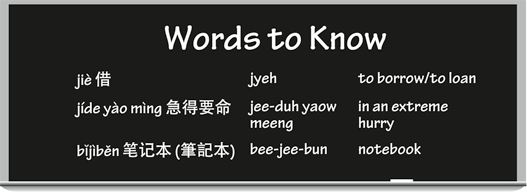Chinese For Dummies (82 page)
Read Chinese For Dummies Online
Authors: Wendy Abraham

 qiÄnbÇ
qiÄnbÇ
é
ç¬
(
éç
) (chyan-bee) (
pencil
)
 xià ngpÃjÄ«n
xià ngpÃjÄ«n
æ©¡ç®ç
(shyahng-pee-jeen) (
rubber band
)
 If you can't find some indispensable item just when you need it, you can always ask someone in the next
If you can't find some indispensable item just when you need it, you can always ask someone in the next
xiÇogéjiÄn
å°éé´
(
å°éé
)
(shyaow-guh-jyan) (
cubicle
). The simplest way to ask is by using the phrase
NÇ yÇu méiyÇu
_____?
ä½ æ没æ
_____? (nee yo mayo _____?) (
Do you have any _____?
) Use that phrase as often as you like. Just make sure you can reciprocate whenever your
tóngshì
åäº
(toong-shir) (
co-worker
) needs something as well.
NÇ yÇu méiyÇu dìngshÅ«jÄ«?
ä½ æ没æé书æº
? (
ä½ æ没æè¨æ¸æ©
?) (nee yo mayo deeng-shoo-jee?) (
Do you have a stapler?
)
NÇ yÇu méiyÇu gÄngbÇ?
ä½ æ没æé¢ç¬
? (
ä½ æ没æé¼ç
?) (nee yo mayo gahng-bee?) (
Do you have a pen?
)
Talkin' the Talk
Ollie and Tommy are co-workers in Xi'an. Ollie is about to go into a meeting but can't find his notebook. He quickly checks with his good friend Tommy in the next cubicle.
Ollie:
Tommy! WÇ jÃde yà o mìng! Kuà i yà o kÄihuì le, kÄshì zhÇobúdà o wÇde bÇjìbÄn.
Tommy! waw jee-duh yaow meeng! kwye yaow kye-hway luh, kuh-shir jaow-boo-daow waw-duh bee-jee-bun.
Tommy! I'm in such a hurry! We're about to have a meeting, and I can't find my notebook.
Tommy:
WÇ yÇu bÇjìbÄn. Jiè gÄi nÇ.
waw yo bee-jee-bun. jyeh gay nee.
I have a notebook. I'll loan it to you.
Ollie:
Tà i hÇo le! Xièxiè.
tye how luh! shyeh-shyeh.
That's great. Thanks.

 Whenever you add -
Whenever you add -
de yà o mìng
å¾è¦å½
(duh yaow meeng) right after a verb, you add a touch of drama and emphasize whatever the verb is. For example, if you say you're
lè
i
ç´¯
(lay), that means you're tired. But if you say you're
lèi de yà o mìng
ç´¯å¾è¦å½
(lay duh yaow meeng), that means you're absolutely exhausted. If you're not just
máng
å¿
(mahng) (
busy
) but rather
máng de yà o mìng
å¿å¾è¦å½
(mahng duh yaow meeng), you're extremely busy, Ârunning around like a chicken without a head. Here are some useful phrases to Âcompare:
WÇ lÄng.
æå·
. (waw lung.) (
I'm cold.
)
WÇ lÄng de yà o mìng.
æå·å¾è¦å½
. (waw lung duh yaow meeng.) (
I'm freezing.
)
JÄ«ntiÄn hÄn rè.
ä»å¤©å¾ç
. (
ä»å¤©å¾ç±
.) (jeen-tyan hun ruh.) (
It's very hot today.
)
JÄ«ntiÄn rè de yà o mìng.
ä»å¤©çå¾è¦å½
. (
ä»å¤©ç±å¾è¦å½
.) (jeen-tyan ruh duh yaow meeng.) (
It's a real scorcher today.
)
 If you're going to emphasize a verb by adding -
If you're going to emphasize a verb by adding -
de yà o mìng
after it, you can't also use
hÄn
å¾
(hun) (
very
) in the same breath. It makes your statement redundant.
Conducting a Meeting
Congratulations! You've finally set up shop in your new office in Beijing or welcomed your business partners from Taiwan and are all set to have your first business meeting. But just what is the purpose of your
huìyì
ä¼è®®
(
æè°
) (hway-ee) (
meeting
)? Is it to
yÇnshì
æ¼ç¤º
(yan-shir) (
give a presentation
) about a new
chÇnpÇn
产å
(
ç¢å
)
(chahn-peen) (
product
)? Is it to
tánpà n
è°å¤
(
è«å¤
)
(tahn-pahn) (
negotiate
) a
hétóng
åå
(huh-toong) (
contract
)? How about
shòuxùn
åè®
(
åè¨
)
(show-shwun) (
training
) â either you or your Chinese colleagues? Do you have a specific
yìchéng
(
è®®ç¨
)
è°ç¨
(ee-chung) (
agenda
) in mind already? I hope so. You definitely don't want to look unprepared.
Scheduling and planning a meeting
You may be one of those people who needs to
Änpái huìyì yìchéng
å®æä¼è®®è®®ç¨
(
å®ææè°è°ç¨
) (ahn-pye hway-ee ee-chung) (
schedule a meeting
) just to prepare for another meeting. Here are some things you may want to do at such a preliminary meeting:
 jiÄjué wèntÃ
jiÄjué wèntÃ
解å³é®é¢
(
解決åé¡
) (jyeh-jweh one-tee) (
solve problems
)
 tÇolùn wèntÃ
tÇolùn wèntÃ
讨论é®é¢
(
è¨è«åé¡
) (taow-lwun one-tee) (
discuss problems
)
 tuánduì jià nshè
tuánduì jià nshè
å¢é建设
(
åé建è¨
) (twan-dway jyan-shuh) (
team Âbuilding
)
